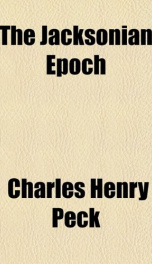the jacksonian epoch

Purchase of this book includes free trial access to www.million-books.com where you can read more than a million books for free. This is an OCR edition with typos. Excerpt from book: CHAPTER II Maritime Aggressions of England and FranceThe Restrictive System Clay as Speaker of the HousePreparations for WarMadison Accepts Clay's Programme and is Re-electedThe Embargo and the Declaration of War against EnglandThe Political Aspect of the WarClay's Reply to QuincyThe Treaty of GhentThe Effect of the WarThe Bank of the United StatesClay's Change of Opinion in Regard to it The Tariff of 1816The Policy of Internal Improvements, Madison's Veto, and Monroe's Hostile PositionClay Opposes Monroe's AdministrationHe Advocates Internal Improvements and the Recognition of the South American Republics When Clay entered the House, at the opening of the Twelfth Congress, it was perfectly suited, unlike the Senate, for a theatre of debate. It had one hundred and forty-two members and but eight standing committees, and most of its important business was transacted in committee of the whole. It had only lacked the occasion to develop its quality as a debating body, and the occasion was now supplied by the complications that resulted in the war with England. For nearly thirty years England had harassed our maritime commerce. Prior to 1805 the difficulties so caused had been smoothed or smothered; but with Fox gone and Canning in power her depredations increased in number and her admiralty rulings in rigor, to the havoc of our neutral carrying trade. For twenty years our vessels had been boarded and our seamen impressed into her naval service, both aggressions springing from the unlimited assumption of the right of search. It is not to be doubted, however,Ch. II.] MARITIME TROUBLES 47 that the boldness of our traders, instigated by the immense profits of success, led to the perpetration of gross frauds upon England during the wars of the period, through fo...
Info about the book
Author:
Series:
Unknown
ISBN:
1558534318
Rating:
4.5/5 (4)Your rating:
0/5
Languge:
English
Users who have this book
Users who want this book
What readers are saying
What do you think? Write your own comment on this book!
write a commentGenre
if you like the jacksonian epoch try:
Other books by this author
Do you want to exchange books? It’s EASY!
Get registered and find other users who want to give their favourite books to good hands!

